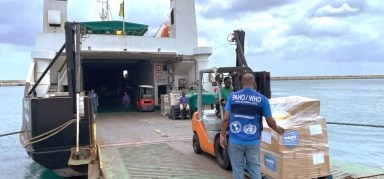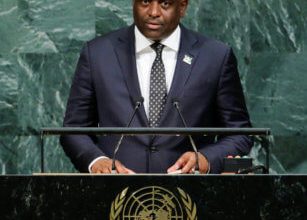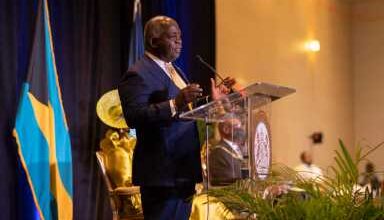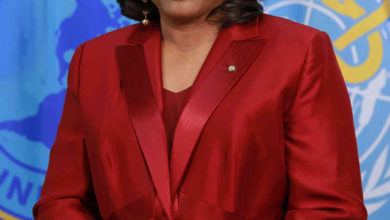PAHO providing healthcare support for Grenada, St. Vincent and the Grenadines following Hurricane Beryl

The Pan American Health Organization (PAHO) is supporting the healthcare response to affected Caribbean countries following Hurricane Beryl’s devastating onslaught last month.
Beryl, the earliest recorded Category 5 hurricane in the North Atlantic, struck the eastern Caribbean on July 1 as a high-end Category 4 storm; PAHO noted it brought significant destruction, particularly to the islands of Grenada and St. Vincent and the Grenadines.
Beryl directly affected over 80,000 people across the two countries, and caused 11 deaths in those locations, PAHO said. The hurricane also led to widespread damage to infrastructure, and left at least 15 health facilities inoperable.
“Our hearts go out to the people of Grenada and St. Vincent and the Grenadines,” said PAHO Director Dr. Jarbas Barbosa, highlighting PAHO’s support. “PAHO is with you in every step to rebuild and restore access to health in affected communities.
During the immediate aftermath of the hurricane, PAHO said it activated its emergency response mechanisms to provide critical support to Grenada, and St. Vincent and the Grenadines, through its Emergency Operation Centers in Barbados and Washington, as well as its specialists stationed in both countries, who act as first responders on the ground.
PAHO experts in the areas of water and sanitation, health facility damage assessment, environmental health, and logistics, have been deployed to the islands to assess the situation on the ground and coordinate the response alongside local health authorities.
PAHO said its experts in the areas of water and sanitation, health facility damage assessment, environmental health and logistics, have been deployed to the islands to assess the situation on the ground and coordinate the response alongside local health authorities.
The group is also assisting with the completion of a comprehensive assessment report and budget for the provision of water, sanitation and hygiene for St Vincent and the Grenadines. The Government approved this report and allocated 1 million Eastern Caribbean dollars (US$370,000) to facilitate the implementation of the recommendations, PAHO said.
PAHO said detailed damage assessment and estimates for the restoration of health facilities is also being undertaken.
With logistical support from the United Nations’ World Food Program (WFP) and the Barbados Defense Force, PAHO said it rapidly mobilized critical relief items from its strategic reserve in Panama to support immediate response operations in affected communities.
PAHO said water purification tablets, water testing kits, water pumps and generators were delivered in Grenada and St. Vincent and the Grenadines to be used at local health facilities impacted by Hurricane Beryl.
“These deployments and donations aim to support countries in ensuring the provision of essential health care services and also help reduce the risk of disease outbreaks,” said PAHO, adding that it has also supported the implementation of surveillance in emergency shelters in both Grenada and St. Vincent and the Grenadines “to monitor and mitigate potential health risks”, and that it continues to work closely national health authorities to strengthen their routine surveillance systems.
Additionally, PAHO said it activated the regional network of Emergency Medical Teams (EMT). It said these are teams of health professionals (doctors, nurses, physiotherapists, etc.) who support local health systems by providing direct clinical care to people affected by emergencies and disasters.
With support from Samaritan’s Purse, PAHO said two EMTs have been deployed so far. It said these teams are self-sufficient, ensuring no additional burden is placed on host countries.
PAHO said it continues to monitor the situation closely and “stands prepared to provide additional support as needed.”
The regional health organization said it is working in close coordination with international and regional partners “to ensure a comprehensive and collaborative response to this emergency and to provide a full assessment of the hurricane’s impact on the health and wellbeing of affected populations.”
Based on currently available information, PAHO said the United Nations Office for the Coordination of Humanitarian Affairs (OCHA) estimates that the number of people in need of immediate humanitarian assistance is nearly 60,000 across the two countries, and that approximately US$9 million are needed to support the overall response needs across all sectors.
While Grenada and St. Vincent and the Grenadines were among the hardest hit, PAHO said Beryl also caused significant damage to Barbados, the Dominican Republic, Haiti, Jamaica, Mexico, St. Lucia, the United States and Trinidad and Tobago.
PAHO said it assists its member states to strengthen their health sector’s capacities in the area of prevention, risk reduction, preparedness, surveillance, response to and early recovery from emergencies and disasters related to any hazards.
When national capacities are overwhelmed, PAHO said it supports countries to lead and coordinate the international health response to contain disasters, including outbreaks, and to provide effective relief and recovery to affected populations.




